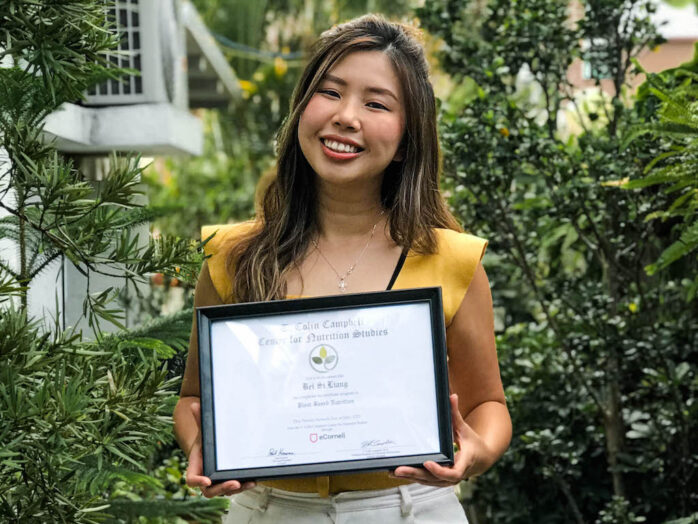“I’m a plant-based nutrition coach who helps people on their way to a healthier lifestyle. I focus on plant-based nutrition, healthy eating habits, and your individual health. I’m a health coach, a cooking expert, and I like to be creative in the kitchen. I also like to share my knowledge with others who want to live a more healthy and active lifestyle, or want to improve their health and performance.”
A plant-based nutrition coach is someone who helps people who want to eat a plant-based diet to do so, whether by offering advice, setting up a home-based or mobile program, or designing a whole program for a business. This blog features a series of posts with tips and advice for people interested in developing a successful plant-based nutrition coaching business.
Being a plant-based nutritionist can be a very exciting, rewarding experience and is a great way to help others. Let’s get started.
The majority of plant-based coaches have a backstory

Jennifer Ernst, MSCN, PN1’s journey began when she was ten years old, when her grandfather suffered a heart attack. It jolted the family into action, and they resolved to eat more healthily as a result. So they switched to a plant-based diet—they just didn’t know what to call it.
The majority of their meals were made with produce that they had grown themselves. She explains, “We lived on a farm and cultivated our own vegetables.” “With the exception that we also had hens and cows.”
Ernst became uneasy buying meat that wasn’t from her own backyard as she grew older and moved away from the farm.
She didn’t mind eating meat in general, but she didn’t feel comfortable doing so without knowing where it originated from or how it was produced.
While watching a Netflix documentary, Scott Burgett, CSCS, PN1 made the decision to go completely plant-based.
For a number of years, he’d been gradually transitioning to a more plant-based diet.
But when he saw a documentary about the tragic destiny of male young chickens in the egg industry (they’re routinely murdered at one day old because they can’t lay eggs), he realized it was time to go vegan.
Both Ernst and Burgett have established themselves as prominent plant-based nutrition coaches. And their experiences represent turning points in their lives when their values became unavoidable. Those events steered them down the route they’re on now.
If you’re reading this, chances are you’ve got a story to tell
Personal tales can be powerful and inspiring, but they don’t always help people change their habits. It’s a big difference between mastering plant-based eating for yourself and helping others do it.
That’s why we talked to several experienced coaches on how to become a plant-based nutrition coach and how you can assist your clients benefit from this way of eating as well.
We’ll cover the following topics in this article:
- What are the responsibilities of plant-based nutrition coaches?
- What are the steps to becoming a plant-based nutrition coach?
- How can you know if a plant-based certification is required?
- How much do plant-based nutritionists earn?
- The most significant obstacles that plant-based nutrition instructors face and how to overcome them
- Why is now the perfect moment to start a plant-based nutrition coaching business?
So, get your plant-pants on and let’s get this party started.
+++
Over 150,000 health & fitness professionals certified
Save up to 30% on the leading nutrition education curriculum in the market.
Gain a better grasp of nutrition, the authority to coach it, and the capacity to transform that knowledge into a successful coaching business.
First and foremost, what exactly is a plant-based nutrition coach?

The term “plant-based nutrition coach” is more of a catchall than a formal certification. It’s a term that refers to a type of nutrition coaching that emphasizes plant-based diet.
A plant-based coach does not have to be vegan or vegetarian. Or that they only work with vegan and vegetarian clients.
The term is a lot more nebulous than that.
Simply simply, a plant-based nutrition coach encourages people to consume more plant-based foods.
But let’s take a closer look at it.
It’s not just about eating more fruits and veggies when it comes to eating more plants. Grains, nuts and seeds, beans and legumes, and plant-derived lipids are all included in the category of “plants.”
The list of plant-based foods in the table below isn’t exhaustive, but as you can see, there’s enough to pick from.
Foods derived from plants
| Proteins | Carbohydrates | Fats | Vegetables |
|---|---|---|---|
| Lentils* Beans* Split peas* Black-eyed peas* Tempeh Tofu Edamame Protein powders made from plants Vegetable protein that is textured Yogurt made with soy Seitan Burgers made with black beans Veggie burgers in the traditional sense Meats made from plants Protein bars made from plants | Oats, beans, and lentils Farro Amaranth Buckwheat Quinoa Rice that has been harvested from the wild Taro Corn Barley Millet Sorghum rice (whole grain) rice that is black in color rice that is white Potatoes Fruit, both fresh and frozen Sweet potatoes are a type of potato that is used Yuca Crackers made of granola Bars of granola Pasta Bagels, breads, muffins, and wraps are all available. Couscous unsweetened canned, dried, and pureed fruit Juices from vegetables Juices from fruits | Seeds of hemp Peanut butter and peanuts Pepitas and pumpkin seeds Pistachios Almond butter and almonds Sunflower seeds and sunflower seed butter are two types of sunflower seeds. Flax seeds are a type of flax seed. Chia seeds are a type of chia seed that Walnut oil Olive oil Avocado and avocado oil are two types of avocado. Meat from the coconut Cashews Olives Walnuts Nuts from Brazil Pecans Sesame seed oil Canola oil, peanut oil Flaxseed oil is made from flaxseed. chocolate (dark) Coconut milk and coconut oil are two types of coconut. | Onions, beets, and peppers Carrots Squash Pumpkin Collards of Broccoli and Lettuce Spinach Cabbage Peas in a snap Brussels sprouts (Brussels sprouts) Celery Kale Beans (green) Arugula Eggplant Turnips Asparagus Radishes Tomatoes |
* If there isn’t another protein-rich food in the meal, these foods are considered proteins. Aside from that, they’re classified as carbs.
Here’s the thing: there are a lot of different ways to consume a plant-based diet. And that’s great news since it means there are plenty of opportunities to work as a plant-based nutritionist.
You could, for example, coach any or all of the following:
- Plant-curious eaters: Those who want to eat more plant-based foods but aren’t sure how to go about it. (This does not imply that they must abstain from eating meat.)
- People who eat largely plants but also eat some non-plant items are known as plant-forward or plant-centered eaters. These people could be pescatarians, vegetarians, or meat eaters on occasion.
- People who only eat plant-based meals are known as fully plant-based eaters. Vegans, for example, frequently avoid all animal products. (This includes not only food, but also leather, fur, and personal care goods that have been tested on animals.)
The tactics of successful plant-based nutrition coaches differ.
Ernst, for example, eats primarily plant-based, but she won’t say no to a restaurant meal with milk. She works with her clients to gradually transition them to a more plant-based diet based on their starting place.
“I don’t think stepping into a 100% plant-based diet is fair if a client is already eating only takeout,” Ernst adds. “They bounce back too quickly in the opposite direction.”
Burgett, on the other hand, adopts a different strategy. His company is named Evolution Vegan Academy, and he is a vegan. As you might expect, he only works with vegans and vegans-in-training.
He works with vegans who want to improve their athletic performance in particular.
Below, we’ll go through how to define your plant-based coaching niche, as well as the advantages of eating a plant-based diet.
The conclusion, though, is that being a plant-based nutrition consultant may be done in a variety of ways.
Question #2: What steps do I need to take to become a plant-based nutrition coach?

Although a certification in plant-based nutrition is available, there is no formal body that certifies you as a trained plant-based nutrition coach.
That’s thrilling because it means you have a lot of control over how you become one.
Getting the education you need to truly help people, according to professional coaches, is a sensible first step.
There are a multitude of ways to do this, according to the plant-based coaches we spoke with. Many of them employed a mix of the strategies listed below to establish themselves as coaches.
The first tool is to obtain a certification in plant-based nutrition.
Only a few certifications exist that are solely focused on plant-based nutrition.
As previously stated, no certification will grant you the title of “plant-based nutrition coach.” Most of the time, they issue a plant-based nutrition “certificate of completion.”
Ernst has taken two of the industry’s most well-known courses.
The first is the Plant-Based Nutrition eCornell Certification Program from the T. Colin Campbell Center for Nutrition Studies. This is a $1,260 online course that lasts six weeks (USD).
Ernst had just finished nutrition school when she took this course—she started college at 37 and obtained a master’s degree in nutrition shortly after—so she was well-versed in nutrition science. This plant-based certification, on the other hand, took a closer look at two topics: the ethics of plant-based diet and the potential health benefits.
Ernst also attended the American College of Lifestyle Medicine’s program. This organization offers training for physicians, health coaches, and allied health professionals who want to introduce whole-food plant-based nutrition to their patients or clientele. The length and cost of the courses vary, ranging from $300 USD to over $1,000 USD depending on which one you choose.
What these courses lack, according to Ernst, is instruction in the art of coaching, such as how to:
- communicate successfully with clients
- elicit their true motivations
- recognize the numerous reasons that make changing their behaviours more difficult or simpler
This is one of the reasons why, despite her extensive knowledge of nutrition science, Ernst found the Level 1 certification to be beneficial (more on this below).
In addition, most plant-based nutrition certification courses do not cover how to coach non-plant-based clients.
So, depending on your target market, they may or may not be able to offer you with all of the information you require to get started.
Get a general nutrition certification as a second tool.
A basic nutrition certification will provide you with the skills you’ll need to work with clients that have different eating preferences.
To gain a better idea of how a “general” nutrition certification compares to a plant-based certification, we spoke with a number of plant-based coaches who are also certified (full disclosure!).
(Note: After completing our Level 1 certification, you are eligible to enroll in our specialist course, “How to Coach a Plant-Based Diet.”)
Renée Rolls, PN1, EIF Master Trainer, CF-L1, who improved her personal health through exercise and plant-based nutrition, says, “One of the things that really attracted me about the certification was that it was more well-rounded.”
She’d already done a lot of research on plant-based eating and thought she knew everything she needed to know.
“It’s useful if you can start seeing alternative points of view when you’re used to doing something a specific way,” she explains.
Even though Rolls intended to focus on plant-based nutrition coaching, it was critical for her to understand how to teach all types of eaters. She explains, “I can still have my own style of eating while coaching a range of different methods of eating.”
As part of her continuing education as a dietitian, Emilie Rice, MS, RDN, LDN, CPT, PN1, decided to earn a PN certification. She appreciated the program’s focus on the mechanics of how to coach, particularly when it came to communicating dietary ideas to the ordinary client.
She explains, “I was looking for methods to simplify how I teach when I’m coaching nutrition.” Rice enjoyed learning how to use the hand portions system, which is a simple and convenient approach for clients to control and measure their food intake.
There are, of course, numerous more general nutrition certifications available. Check out our guide on how to choose the proper nutrition certification for you to learn more about them.
Option #3: Become self-taught

Burgett first chose to self-learn about plant-based nutrition rather than pursue a nutrition coaching certification. He was previously familiar with scientific-based stuff, having earned a bachelor’s degree in exercise science and working as a strength coach for a major baseball team.
But, rather than diving directly into nutrition coaching, he took his time to make sure he had all of the information he needed.
Burgett gathered as much information as he could from books, documentaries, YouTube videos, and other sources when he initially went vegan in 2017.
He also launched a famous vegan blog where he answered often asked questions. (Consider this: Is it safe to eat tofu? How much protein do vegans and vegetarians require?) He also developed his own recipes.
Burgett gathered the expertise he needed to launch a plant-based coaching business as he learnt to answer his audience’s inquiries. But it wasn’t until 2019 that he started giving plant-based nutrition coaching and introduced his online products.
There are a few potential disadvantages here: That’s nearly two years of self-study, which is much longer than most conventional certification courses.
Plus, unless you have a science or health background like Burgett, figuring out what information you need and where to get it might be challenging.
On the other hand, this alternative is likely less expensive than a course and can be used in conjunction with any other instructional instrument.
Whether you choose to follow this route or not, Burgett has some advise for you: Look out educational sources that you agree with, as well as those that you disagree with. (For example, you could read a book about the Paleo or carnivore diet.)
“Exposure to several beliefs will provide you with a well-rounded background,” he advises.
Experiment on yourself with tool #4.
One of the pillars of’s own coaching approach is self-experimentation.
Why? There’s no better way to figure out what works for YOU than to do it yourself. While everyone’s nutrition choices and habits are different, if you want to be a plant-based nutrition coach, you need have prior experience with plant-based eating.
This is especially important if you want to work in the vegan or entirely plant-based arena, according to Burgett.
“Vegans and others who follow a plant-based diet are not the same as omnivorous customers. Their ‘whys’ and values differ, and they want to be able to trust that the person on the other end is living up to their standards.”
Burgett’s advise to aspiring coaches is to “try things, talk to people, and practice it yourself.” You’ll eventually figure out what works and what doesn’t.”
Even if you want to take a more flexible plant-based strategy, Rolls says this is sound advice.
“I completed my CrossFit certification in February, and they have their own style of eating, which was quite challenging for me as a vegan.” (Many CrossFitters follow a Zone diet, which emphasizes animal proteins.)
The experiment was worthwhile, even if it didn’t work out for Rolls: “Just being able to walk into it open-minded and observe how it worked was valuable.”
Key takeaways: Plant-based nutrition coaches will benefit from educational resources. |
|
|---|---|
| Certification in plant-based nutrition | |
|
|
| Certification in general nutrition | |
|
|
| Self-education | |
|
|
| Experimenting with plant-based diets on my own | |
|
Question #3: What are the responsibilities of plant-based nutrition coaches?

One-on-one nutrition coaching is offered by the majority of plant-based nutrition coaches.
Others lead organizations, develop online programs, or give talks. In truth, there are numerous possibilities for a plant-based nutrition coach’s day-to-day duties.
Burgett runs his coaching business entirely online. He also gives all of his clients with tailored training regimens, thanks to his background as a strength coach.
He consults with his assistant coaches, tends to his active Facebook group, and creates material for his social media sites when he’s not programming or talking to customers via phone or video calls.
Ernst specializes in one-on-one nutrition coaching, both in person and over the phone. She also conducted in-person plant-based cooking classes a couple of times a month prior to COVID.
These classes helped her connect with potential customers in her community, as well as equipping her current clients with the knowledge and skills they need to succeed with plant-based eating.
“People understand that a carrot is superior to a Cheeto, but they don’t know how to eat a carrot,” she explains. “Unless you massage it or add a little lemon to break down some of the plant walls, kale tastes very bad.” To put it another way, Ernst makes it possible for people to appreciate the foods they know they should be eating.
In addition to running their own nutrition counseling businesses, plant-based nutritionists may work as:
- In doctor’s offices, hospitals, or wellness centers, health coaches are available.
- Health food, natural beauty, and supplement store consultants
- Nutritionists on staff in gyms, spas, and yoga studios
- Wellness consultants in the workplace
- Private chefs or recipe developers, food preparation services, or plant-based eateries
- In the plant-based space, there are speakers, bloggers, and social media influencers.
As a plant-based coach, what are you not qualified to do?
Unless you’re expressly MNT-accredited, medical nutrition therapy (MNT)—which entails delivering nutrition recommendations to treat or cure conditions like diabetes, autoimmune disorders, or cancer—is out of bounds.
You won’t be able to achieve it with only a nutrition or health coaching certification, and you shouldn’t attempt.
In the plant-based world, this is extremely vital to comprehend.
Plant-based food is sometimes promoted as a strategy to aid people with health problems like heart disease, type 2 diabetes, and high blood pressure.
While plants offer several health benefits, and you can still give clients advice on how to make their diets more plant-based, make sure you’re MNT-accredited before prescribing a plant-based diet for a health problem.
The norms and regulations governing what people with nutrition certifications are allowed to do differ depending on where they live.
In several states in the United States, certified dietitians are the only ones who can create meal plans. However, nutrition coaches can still assist people with their eating habits in these conditions as long as they aren’t instructing them what they should and shouldn’t consume.
If you get a certification, you’ll discover that meal plans, declaring foods “off-limits,” and telling people what to eat aren’t really our style. You’ll discover how to attain results without these approaches in our nutrition certification.
Do you want to see how we do it? Check out Food Changes That Save Lives, our free e-course.
Question #4: What does it cost to hire a plant-based nutrition coach?

Certified nutrition coaches could charge anything from $40 to $100 per hour, according to the information we obtained for this piece.
Some coaches believe that there is more earning potential for coaches in the plant-based world than elsewhere.
Burgett says, “I’m a firm believer that plant-based is where the world is headed.” This is due to a number of factors. Environmental degradation is at an all-time high, and people are becoming more aware of how their dietary choices affect the ecosystem, according to Burgett.
So, while plant-based eating is popular right now, Burgett doesn’t see it going away anytime soon. “If you’ve been thinking about it, now is the time to do it.”
Ernst agrees that being a plant-based coach is a terrific time right now. She’s busier than ever, even with COVID.
She says, “Fiscally, I’m up this year.” After lowering her pricing to make her services more accessible to clients during the pandemic, she’s still doing well. Her in-person cooking workshops have had to be put on hold, but she’s more than made up for it with virtual one-on-one client sessions.
So, how does this affect you?
Okay, it’s fantastic to hear that plant-based coaches can be financially successful. But how do you turn your enthusiasm in plant-based eating into a lucrative coaching career?
You can begin by going to: A comprehensive report—Nutrition coaching: How much should you charge?—is available. we developed a report outlining what we learnt from a study of 1,000 nutrition coaches, as well as advice on how to get top-tier rates.
Why plant-based coaching may be able to help you increase your earnings
There’s an old adage that says there’s gold in niches. To be sure, it’s become a fitness industry cliche, but figuring out who you’re most enthusiastic about and skilled at assisting might help you attract the proper clientele.
Burgett only works with fitness-oriented vegans and wannabe vegans. He chose to refer out anyone who did not wish to be vegan after initially being open to all types of eating.
Burgett’s reasoning: He wants to stay true to his mission: “to build the world’s best community of fit vegans.” He also attributes some of his company success to identifying and adhering to a specialty.
Similarly, Rolls focuses on working with mothers.
“A lot of them have one or two children and are finding that they don’t have as much time to look after themselves, and as a result, things in their bodies aren’t looking or feeling the same as they used to,” she says.
Rolls has discovered that plant-based nutrition, which focuses on adding more complete plant meals rather than removing animal foods, is particularly beneficial for this population.
Not just because of the flexibility and results it delivers, but also because of the message it sends to children.
“Kids imitate whatever we do. So when we’re in the kitchen slicing up produce and tasting all kinds of grains and veggies, that automatically goes down to the kids.”
Question #5: What motivates people to work as plant-based nutritionists?

At, we frequently discuss the importance of discovering your “why,” or your inner motivation for accomplishing something.
Plant-based coaching isn’t frequently chosen as a job because it’s trendy or sounds interesting.
Instead, plant-based nutritionists are typically enthralled by what the dietary philosophy can accomplish for humans, animals, and the environment.
One of the most enticing things for Rice is the health benefits of eating more veggies. She’s also interested in new research on plant-based diets and athletic longevity (the period of an athlete’s life during which they can continue to perform) as a plant-based dietitian who works with athletes.
Sustainability and animal welfare are both quite important to many plant-based coaches, and the two actually go hand in hand.
Ryan Andrews, MS, MA, RD, RYT, CSCS, a plant-based dietitian and nutrition adviser for says, “When I think of a sustainable diet, a large component of that is clearly ecological sustainability.” “However, everything else falls under that umbrella, including person health, animal welfare, farmer welfare, and food fairness in general.” All of these issues must be addressed for our food system to be really sustainable, he claims.
According to Andrews, this begins with dietary modifications by eaters. “However, I’d like to be cautious and not put all of the blame on individuals. Because it’s not easy to make new food choices all of the time right now.”
As a plant-based nutrition coach, you can help with that.
It may seem insignificant, but each person who makes a small change (such as substituting lentils for meat three times a week or moving from whey to pea protein powder) adds up.
Andrews compares the global move toward eating more plants to a morning traffic jam: “Even if one person doesn’t drive one day, there will most likely still be a traffic jam.” However, if everyone starts making improvements at the same time, traffic patterns will change.” The same may be said for consuming a plant-based diet.
Question #6: What are the prerequisites for becoming a plant-based coach?
We asked plant-based nutrition coaches what they wish they had known when they first started and what they think other plant-based nutrition coaches should know when we spoke with them for this article. Here’s what they had to say.
There are numerous misconceptions about plant-based diet

Dispelling preconceptions about plant-based diet and specific foods like soy, according to Burgett, has been one of the most difficult problems he’s faced.
Another widespread misconception is that vegans don’t need protein.
He claims that “a lot of people in the plant-based vegan community, including doctors, simply sort of neglect protein.”
Burgett claims that he isn’t obsessed with protein, but that it is an important macronutrient for everyone, especially athletes.
Burgett always attempts to educate his clients about the need of protein and the value of choosing a variety of plant-based protein sources.
People are also concerned about the cost of eating a plant-based diet, according to Ernst. “However, it is a highly cost-effective way to eat.”
She goes on to say that this is an important myth to dispel with potential clients. “I believe some consumers may be hesitant to hire a plant-based nutrition coach if they believe it is too costly.”
Plant-based sports nutrition is gaining popularity
Rice opted to work with plant-based athletes as her expertise because of her personal interest in athletics and the fact that there is a growing community of plant-based athletes in Chattanooga, Tennessee, where she is based.
While there is a lot of interest in this field, Rice believes there are a few things you should know if you want to pursue it. As a result, specialist expertise obtained through certification or mentorship may be required.
Rice argues that eating too much fiber, which can occur with a completely plant-based diet, might cause early satiety (fullness) and possibly lead to (unintentional) undereating, putting athletes at risk for relative energy shortage in sport (known as RED-S).
RED-S can have an impact on an athlete’s performance as well as their general health.
“This is why plant-based diets must be balanced, with no excessive amounts of any one component (fiber, fat, carbohydrates, or protein),” she explains.
Be mindful of the signs and symptoms of an eating disorder
Plant-based eating is frequently regarded as a “healthy” way of life. According to Rice, this view can be a motivator for persons with disordered eating and orthorexia to choose it. (Orthorexia is an eating disorder in which people get obsessed with “healthy eating” to the point of causing harm to their mental and physical health.)
For the record, this may occur with any specialized manner of eating, not only plant-based diet.
Rice says it’s crucial for plant-based coaches to be aware of. “As a coach, I’d like to know why you’ve decided to go plant-based.”
Clients may pick the eating approach for a variety of reasons, including health, sustainability, and long-term athletic development, according to her. Rice advises people to reassess if they go deeper and discover it’s tied to disordered eating or even just bragging rights.
One of the reasons it’s a good idea to build up a referral network is for this reason. If you come across a client or potential client in this scenario, you can recommend them to a mental health expert who can help them.
Plant-based coaching is the way of the future in many ways

There is no one-size-fits-all approach to eating. That is undeniable. “However, it’s important to note that a plant-centered, plant-forward, or plant-based diet is not a singular dietary pattern,” Andrews explains. “It’s basically about getting more plants into people’s diets, wherever they are.”
Andrews points out that emphasizing plants in our meals is one of the most significant changes we can make to move toward a more sustainable food system. It’s also one of the most effective ways to lower our risk of disease and ensure we obtain enough nutrients. (See The 5 Principles of Good Nutrition for more information.)
So you want to be a coach who helps people eat more vegetables in some way? You should be quite proud of yourself.
If you’re a coach or wish to be one…
It’s both an art and a science to coach clients, patients, friends, or family members through healthy food and lifestyle adjustments in a way that’s tailored to their individual body, tastes, and circumstances.
Consider the Level 1 Certification if you want to learn more about both.
As a nutrition coach, providing advice to people on how to eat for their health is one of the most rewarding parts of my job. The problem is that many people don’t know what to eat now that the “diet” is over. I wrote this post to share some of the basics of how I got started and how I’ve evolved as a person and as a coach.. Read more about plant-based nutrition course australia and let us know what you think.




